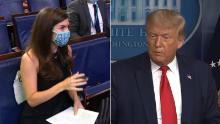begin quote from:
Trump shatters his own show of responsibility on the pandemic
(CNN)The idea that President Donald Trump has turned some new leaf and is now maturely leading the fight against the pandemic is yet again being exposed as a pure political play by his own behavior.
Trump on Monday launched a fresh push to get states to quickly reopen their economies, ignoring the fact that his previous advice on such lines helped spark a surge of cases in the Sun Belt.
Then the President retweeted a video in which a group of doctors make false claims about the virus, including one who says "you don't need masks" because hydroxychloroquine, an anti-malaria drug pushed by the President, is a "cure" in combination with several other drugs. Multiple credible scientific studies say the treatment is ineffective against Covid-19. The video, which went viral on YouTube, was later removed by Facebook and Twitter because it spread misinformation.
It was just the latest occasion when Trump's scripted shows of responsibility about the virus, witnessed in his return to the White House briefing last week, were undermined by what appears to be his true, conspiratorial, politicized views. Only last week, the President grudgingly became one of the last public officials to endorse the use of masks to slow the spread of the virus. Now, yet again, he is undercutting government advice on the matter.
Trump's latest wild swings on the virus came as Senate Republicans split over a new $1 trillion stimulus bill, with some conservatives warning that maintaining federal unemployment benefits at current rates would deter a return to work as the virus rages and delay the restoration of economy.
Their argument was a fresh sign that Trump and his allies on Capitol Hill are still fighting the pandemic they wish existed, rather than a virus that unfolds at its own pace and is oblivious to their artificial political and economic timetables.
The Senate impasse predated exceedingly difficult negotiations with Democrats and will inevitably degenerate into a hyper-partisan struggle given the stakes of the approaching election. But any delay could could see millions of Americans who lost jobs in lockdowns deprived of most of a $600 a week federal government lifeline -- that has already paid out for the last time at previous levels.
It also emerged Monday that Trump's national security adviser Robert O'Brien, who works in the President's mask-free West Wing, tested positive for the coronavirus, in a sign of how flaunting basic precautions leaves no one safe from infection even if such steps are politically unpalatable.
The machinations in Washington unfolded against a backdrop of a crisis that is nowhere near fading despite Trump's upbeat rhetoric. While there are signs the latest explosion of sickness in southern and western states may be cresting, the situation remains dire. On Monday, Johns Hopkins reported 56,336 new cases and 1,076 reported deaths.
New reminders of how the virus has fractured American life came with news of new outbreaks in New Jersey, which endured many painful weeks of shutdowns to get Covid-19 under control. And baseball's return is in turmoil after only three days with the Miami Marlins canceling two games after a number of coaches and players tested positive. Florida in particular has become a global ground zero for Covid-19 cases, two months after Gov. Ron DeSantis stood outside the White House bragging about his state's success over the virus.
Reflecting the fact that normality is many months away, Google said on Monday that its employees would work from home until at least July 2021 -- contradicting the President's new claim that a rapid economic recovery is already underway.
Trump returns to agitating for reopenings
The President has little patience for such long horizons.
He did spend last week trying to show Americans that after months of denial and indifference, he was now taking the virus seriously after its wildfire spread through states that followed his advice to open up early.
But his remarks on Monday suggest that the President is still working not with a timetable set by the most prudent way to suppress the worst public health crisis in 100 years but by the fast dwindling timeline set by his reelection campaign.
During a visit to North Carolina to tout vaccine development, Trump presented his habitually upbeat and misleading summary of a pandemic that is killing hundreds of Americans a day. And he betrayed impatience for even the hardest-hit states to turn the corner.
"These states are not out of the woods, but rigorous compliance with guidelines should allow them to turn the corner, and very, very quickly," the President said, before turning his focus to other unidentified states.
"I really do believe a lot of the governors should be opening up states that they're not opening and we'll see what happens with them."
Maryland's governor criticizes Trump's reopening push
The costs of stay-at-home orders, lockdowns, restrictions on bars and restaurants and all service industries are savage, and have caused deep economic and psychological misery across the country.
But the lesson from the earlier state reopening that Trump championed while flouting guidelines written by the US Centers for Disease Control and Prevention is that opening up too quickly can cause out of control spikes of disease.
The President may now have in mind states like New York, which endured tragic fights against Covid-19 earlier this year, but have been ultra cautious in fully reopening in an effort to prevent a return of high rates of infection.
New York City has managed to reduce its infection rate -- a key marker on the way to slowing transmission -- to 1%, Mayor Bill de Blasio announced on Monday.
In Maryland, Republican Gov. Larry Hogan, who imposed strict stay at home measures and has seen an uptick in cases mostly among younger people since slowly reopening, condemned Trump's rhetoric.
"We are in a holding pattern ... we're not ready to reopen anything, open anything further," Hogan told CNN's Wolf Blitzer on "The Situation Room."
"Twenty-two states are now rolling things back that they had already reopened. We are not in that position either. It's the same kind of messaging that the President had previously and I think it's a mistake to return to that kind of messaging as we are seeing flareups around the country."
Trump's impatience appears to hint at a return to the gut-level calls on Covid-19 that are not based on scientific practice but a desire to see the economy -- that he views as crucial to his reelection -- firing on all cynlinders at all costs.
His frustration became clear as 150 prominent medical experts, scientists, teachers, nurses and other experts signed a letter urging leaders in Washington to shut down the country again and to start over to contain the virus.
"The best thing for the nation is not to reopen as quickly as possible, it's to save as many lives as possible," they wrote.
But Trump's new opening demands mirror his calls for all schools to get back to full operation in coming weeks, while ignoring concerns among parents, teachers and administrators that going too fast would unleash a new virus wave.
And the President's comments also suggest that his more sober approach last week -- that saw him finally endorse the use of masks and warn the pandemic would get worse before it gets better -- was what it appeared to be at the time: a PR effort precipitated by plunging election polls, rather than a serious effort to reassess his approach to the pandemic.
Republicans split over stimulus plan
Republican senators on Monday rolled out at $1 trillion economic support bill to rival a $3 trillion version backed by Democrats.
Although it includes a $1,200 check for most Americans, the plan -- an opening bid in talks with Democrats -- cuts $600 federal support payments to laid off workers to $200. Democrats are demanding that the payments remain at $600 and dismiss Republican attempts to set up a system designed to replace 70% or the prior wages of the unemployed that would incentivize a return to work that many observers say is not yet justified by conditions.
The bill has split the Republican conference -- and has mystified many observers since it includes $1.75 billion for a new FBI headquarters in Washington that has nothing to do with the economic crisis sparked by the pandemic and will pose questions as to why the White House is ready to cut unemployment benefits but is demanding financing for one of Trump's pet projects.
GOP leadership in the Senate did however break with Trump's wishes by including billions more in their legislation to increase Covid-19 testing, though far less than what Democrats have said they wanted.
Republican Sen. Ted Cruz of Texas, one of the states now worst-hit by the virus, said there was "significant resistance" to spending another trillion dollars.
"The answer to these challenges will not simply be shoveling cash out of Washington, the answer to these challenges will be getting people back to work," Cruz said. The senator did not say how people should be expected to return to their jobs in the middle of a pandemic, and the notion of reopening the economy at all costs seems to ignore the need for mitigation measures to stop the spread.
Senate Minority Leader Chuck Schumer, a Democrat from New York, said the cut to federal payments was a non-starter and disagreed with the GOP position that paying people $600 was an incentive for people to stay at home.
"The idea that we need to drastically reduce these benefits because workers will stay home otherwise is greatly exaggerated," Schumer said, with the duel over the bill now framing an explosive backdrop to congressional elections that will take place alongside the presidential race in November.
GOP Sen. Roy Blunt of Missouri, who serves in the party's Senate leadership group, said it was just reality that a number of GOP senators would be opposed on principle to the goals and specifics of the bill.
"When it comes to spending money on these kinds of things, a number of Republicans just are not going to be willing to do that," he said.




















No comments:
Post a Comment